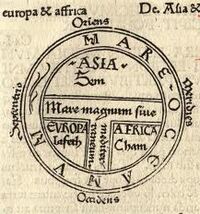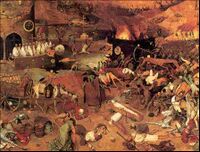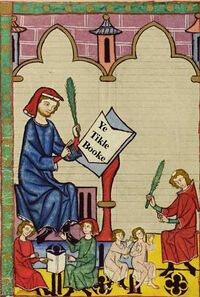Medieval science
“Can I interest you in a lizard smoothie? It's good for gout”
“Nobody expects the Spanish Inquisition!”
Medieval science was the type of bad science popular in the medieval ages. Heavily influenced by the Catholic church, who would burn anyone who disagreed with them, Medieval science fell into five main categories:physics, chemistry, mathematics, biology and geography. There was a sixth category that covered Nun of the Above - but no one knew who she was at that time.
Science in medieval Europe can be contrasted with science in the Middle East where, at the same time as Europeans were still burning anyone for anything, Arabs were busy doing proper science. In China they were already firing rockets at the moon but Europeans didn't know this as they didn't read newspapers or had a printing press to pass around knowledge.
Medieval Physics[edit]
According to medieval physics, the Earth was the centre of everything, because that's where humans live and humans were created in the image of God, so are more important than everyone else. The Earth was believed to stay still and be orbited by the sun, because some passages in bits of the bible that no-one cares about suggest that, and of course the Bible wasn't written by humans who were only aware of the scientific knowledge that existed when they were writing. As was fashionable at that time, anyone who said otherwise would be burnt at the stake for heresy. This is still the law in Colorado, Michigan, New Hampshire and Vatican City, where it is rigourously enforced. When he was not appearing in Queen songs, inventing the telescope or refusing to shave, Galileo attempted to disprove this theory, but The Spanish Inquisition turned up (as always,unexpectedly) with their three main weapons - fear, surprise and a fanatical devotion to the Pope and... their four main weapons - fear, surprise, a fanatical devotion to the Pope and nice red uniforms. Upon being threatened with the comfy chair, Galileo promptly disappeared in a red flash and a puff of smoke, having been summoned by his master, Beelzebub, to a conference of people mentioned in Bohemian Rhapsody.
Medieval Chemistry[edit]
Medieval chemistry was mainly carried out by alchemists and wizards who mixed random chemicals together to see if they turned into gold. This was achieved several times, but promptly forgotten about again. This obsession with gold and lack of imagination resulted in stagnation in scientific research, and prevented the development of magic to a level at which people would notice it. The Arabs, meanwhile, had discovered everything, but no-one in Europe took any notice, because they were racist.
Medieval Mathematics[edit]
Progress in mathematics in the middle ages was hindered by the Church's habit of making arbitrary, often incorrect, judgements about mathematical concepts and then burning anyone who disagreed. Examples include:
- PI equals exactly three
- There are no numbers greater than 39,808,708,947,392.9485369246597
- Triangles have exactly 9.32542575 sides
- The squares of any three numbers always add up to 6
Whilst this was going on, the Arabs had discovered eight new integers, done some stuff that I don't understand that looks like this:. But they didn't work out how to get complicated sums to come out on LaTeX properly, and neither have I. They also managed to count to shitloads.
Medieval Biology[edit]
The main aim of medieval biology was to be able to eat whatever you wanted on a Friday without going to hell. This was achieved by classifying everything as a fish. If you failed to find a way in which an animal had any characteristics, however vague, in common with a fish, you could always give the pope some money instead.
Medieval Geography[edit]
“Imagination is more important than knowledge. Knowledge is limited, imagination encircles the world”

Because no-one had been anywhere in the middle ages, medieval geographers could just make shit up and everyone would believe them. It was generally accepted that the world was flat, and that you lived in the only bit of the world that wasn't inhabited by ferocious monsters. Medieval geographers made up several continents and wrote 'here be monsters' on them. There were prestigious competitions among cartographers in the middle ages to see who could come up with the most ludicrous maps, which led to an explosion in creativity, but little in the way of accuracy. This was one thing the Arabs weren't much better at than the Europeans.



